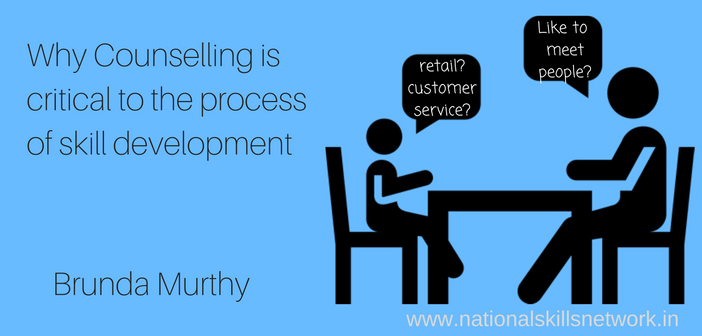In this guest article, Brunda Murthy emphasizes on the skills, abilities and qualities of a counsellor. Brunda’s insights are backed by her rich experience as a Consultant in Nutrition, IT, Web Content Design and Writing. She’s been keenly following the evolution of skilling initiatives with particular focus on empowering youth in rural India.
Counselling has a key role to play in attracting and retaining candidates for skill based training. It gives them the much-needed support to make decisions that can guide them to successful careers. Counsellors working in this domain have to be extra careful while advising candidates. This is because in most cases, for entry-level skilling and vocational courses the candidates are a mixed group comprising dropouts, low-achievers and youth from socially and economically underprivileged background. For most of them, this could be their first opportunity to discover their strengths, prove themselves and earn decent livelihoods.
Counselling – especially counselling trainees who are about to embark upon the most important journey of their career has to be done in a very planned and systematic manner. Counselling can help them decide what they are capable of, what options are more suitable for them, and which areas to focus on.

- A counsellor should first understand the background and capabilities of the candidate and advise accordingly. It’s not a one-size fits all solution when it comes to skill development, livelihoods and career options.
- Counselling should always take a long-term approach. Prospective trainees must be aware of the pros and cons of the area they choose, the challenges they may face, and how to handle and overcome them.
- The ultimate aim of counselling is to reduce confusion and enable the candidates to make their own choices, arrive at their own decisions, and act upon them.
7 key qualities of a counsellor that can impact the life of trainees positively
- Patience/empathy – To understand the counselee and provide effective and suitable advice. Empathy is the ability to step into another person’s shoes and experience what he or she is going through. This is one of the most important skills required to understand the trainee and suggest ways of overcoming their current concerns and fears.
- Communication skills/eliciting skills – Listening is an important skill that the counsellor should possess. Unless you hear out the person clearly you will not be able to get a complete picture and as a result not be able to provide wholesome solutions. The counsellor has to slowly encourage the trainee to talk and then articulate the various paths available for them to move forward.
- Being knowledgeable – Constantly upgrade one’s knowledge to be able to introduce the new opportunities available for the candidates, new skilling options that match with job aspirations.
- Being insightful – A skilled counsellor should be able to identify negative thinking patterns and enable the clients to replace them with positive ones.
- Ability to evaluate – A counsellor should be able to gauge the and interest and skill level of the candidate and suggest ways in which they can enhance their skills in order to be able to take up a job in their chosen area.
- Multi-cultural in outlook – Counsellors help people from all walks of life. They must display multicultural competency, and adopt a multicultural approach. Multicultural competency means that you try to relate to and understand your clients regardless of their race, ethnicity, religious, or socioeconomic background.
- Flexibility – In counselling, the ability to adapt and change the way you respond to meet the candidate’s needs is important. The counsellor should not be rigid and stick to a predetermined solution when the candidate requires a different approach. Being flexible is one of the most important attributes of a professional counsellor,
Nothing negative about it!
Last but not the least is to dispel the notion that counselling is needed for people who are not normal or weak-minded. A lot of people hesitate to approach counsellors out of the fear that people might think something is wrong with them. It is important to talk about counselling in a very positive light and show the benefits of counselling by taking examples of successful people who have gone through counselling earlier.
It is extremely healthy and normal to talk to a person who is capable of understanding your concerns and fears and provide guidance to move forward.
One solution could be to provide online counselling where the candidates are not very conscious of being in the presence of the counsellor physically, and still be able to discuss their problems freely, and make the right decisions about their career.












